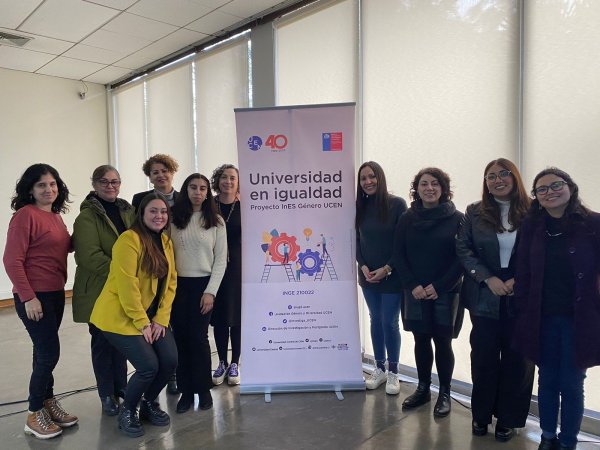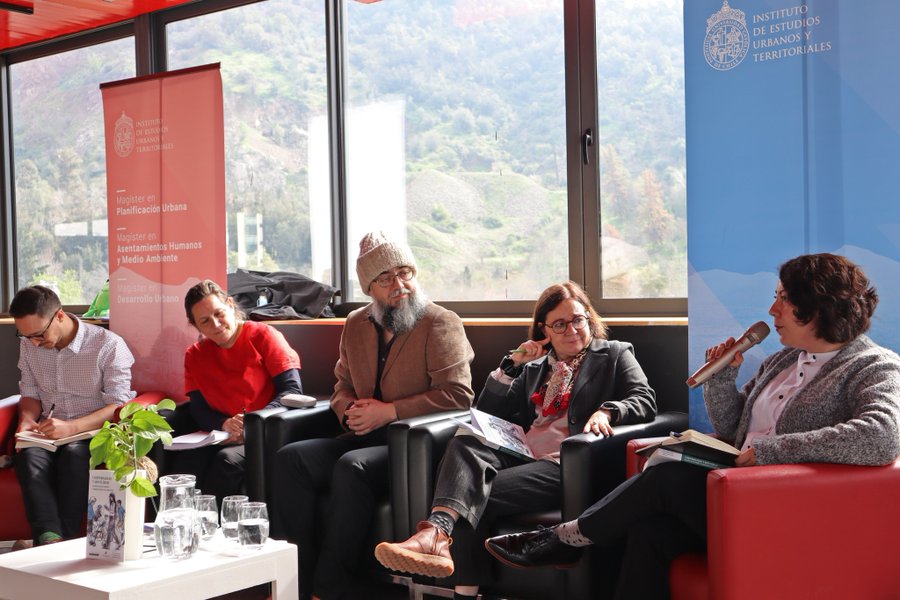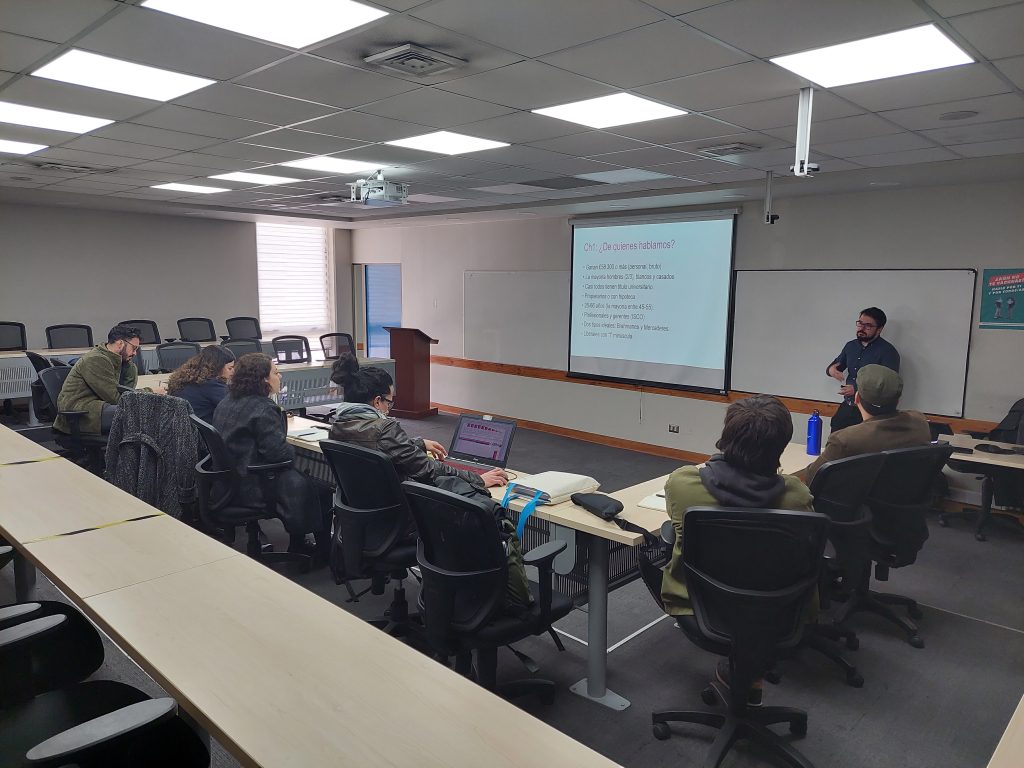Gender autonomy nucleus directed by ESOC researcher held first seminar

Last week was held the first seminar of the Gender Autonomies Nucleus of the Central University (NIAG), which is directed and integrated respectively by Paz Concha and Gabriela Zapata, both from the Max Planck-UCentral group and the research and postgraduate institute of the Faculty of Economics, Government and Communications; it is also integrated by Neida Colmenares, academic of that faculty, and Marcela Betancourt, who is part of the Faculty of Social Sciences of the University of Chile. The seminar was well attended by undergraduate and graduate students from Universidad Central along with researchers. The topics were organized into four roundtables: “Economic life and gender: studies of employment, care and trajectories”, “Migrations, mobilities and gender”, “Gender and intergenerational relations: youth and aging” and finally “Emerging challenges in gender studies”. The educational consequences of early detection of autism and its characteristics were discussed. In addition, on the suicide of young people as a human rights issue. in South Korea and Chile, analyzing their main similarities and differences. It also analyzed the symbolic universe of Chilean television commercials and how they develop gender equality in their contents, between 2019 and 2021, among many other topics, always under a gender perspective or as an axis of analysis. A large number of research papers, thesis projects or final research results for degrees and diplomas were registered among the exhibits. From a third-year psychology student to a doctoral student in law, about 40% of the presentations were in the hands of Central U. students. The main objective of the NIAG is the creation of knowledge in a collaborative and interdisciplinary manner and the seminar was a space where progress was made towards this goal. Now, a next seminar is planned, with presentations by people from outside the university, in order to continue promoting cooperation in the creation of knowledge. Stay tuned to the networks to learn more about the core and actions of “Universidad en Igualdad”.
Núcleo de autonomías de género dirigido por investigadora ESOC realizó primer seminario

La semana pasada se realizó el primer seminario del Núcleo de Autonomías de Género de la Universidad Central (NIAG), que es dirigido e integrado respectivamente por Paz Concha y Gabriela Zapata, ambas del grupo Max Planck-UCentral y del instituto de investigación y postgrado de la facultad de Economía Gobierno y Comunicaciones; también lo integran Neida Colmenares, académica de aquella facultad, y Marcela Betancourt, quien forma parte de la Facultad de Ciencias Sociales de la Universidad de Chile. El seminario contó con una alta participación de estudiantes de pregrado y postgrado de de la Universidad Central junto con investigadores e investigadoras. Las temáticas se organizaron en cuatro mesas: “Vida económica y género: estudios de empleo, cuidados y trayectorias”, “Migraciones, movilidades y género”, “Género y relaciones intergeneracionales: juventudes y envejecimiento” y finalmente “Desafíos emergentes en los estudios de género”. Se habló de las consecuencias educativas de la detección temprana del autismo y sus características. Además, sobre el suicidio de personas jóvenes como un problema de DD.HH. en Corea del Sur y Chile, analizando sus principales similitudes y diferencias. También se analizó el universo simbólico de los comerciales de la televisión chilena y cómo estos desarrollan la igualdad de género en sus contenidos, entre los años 2019 y 2021, entre muchos otros temas, siempre bajo una perspectiva de género o como un eje de análisis. Entre las exposiciones se registró un gran número trabajos de investigación, proyectos de tesis o resultados de investigaciones finales para títulos y grados. Desde una estudiante de psicología de tercer año, hasta una del doctorado en derecho, cerca del 40% de las presentaciones estuvieron en manos de estudiantes de la U. Central. El principal objetivo del NIAG es la creación de conocimiento de manera colaborativa e interdisciplinar y el seminario fue un espacio donde se logró avanzar en ese horizonte. Ahora, se planifica un próximo seminario, con exposiciones de personas externas a la universidad, para así seguir potenciando la cooperación en la creación de conocimiento. Mantente alerta a las redes para enterarte más del núcleo y las acciones de “Universidad en Igualdad”.
Researcher Paz Concha participated in the launching of the book “Corporality and Mobility”.

The book “Corporality and Mobility”, edited by Daniel Muñoz, researcher at the Housing Institute of the University of Chile; Gerardo Mora, UC Design academic; and ESOC member, Paz Concha, was launched at the UC Institute of Urban and Territorial Studies. The book, which aims to study everyday mobility from the role of the body in this process, was born under the auspices of the Research Network on Body and Mobility (RICMO), which seeks to consolidate the relationship between the study of the body and everyday mobility as a line of research with a more qualitative approach. In the work, published in the collection Estudios Urbanos UC and RIL Editores, 13 authors participated and analyzed various topics related to daily mobility. It is divided into three sections: one of more conceptual reflections; another of description of daily mobility practices; and a third part on methodological elements that can be useful to understand this process of daily mobility from the body. “I am co-author of three chapters that would come to be the introduction; a chapter with Francisca Avilés based on my postdoctoral research and that is about moving in atmospheres, it is called ‘Experience of change and transition in Santiago markets’; one with Cristóbal Vergara who was my master’s student when I was teaching at the UC,” explains Concha. The book received support from the UC Institute of Urban Studies, the COES center, the Movyt Millennium Nucleus and the UC School of Design.
Investigadora Paz Concha participó del lanzamiento del libro “Corporalidad y Movilidad”

En el Instituto de Estudios Urbanos y Territoriales UC se realizó el lanzamiento del libro “Corporalidad y Movilidad”, editado por Daniel Muñoz, investigador del Instituto de la Vivienda de la Universidad de Chile; Gerardo Mora, académico de Diseño de la UC; y la integrante de ESOC, Paz Concha. El libro, que tiene por objetivo estudiar la movilidad cotidiana a partir del rol del cuerpo en este proceso, nace al alero de la Red de Investigaciones en Cuerpo y Movilidad (RICMO), que busca consolidar la relación del estudio entre el cuerpo y la movilidad cotidiana como una línea de investigación con un enfoque más cualitativo. En la obra, publicada en la colección Estudios Urbanos UC y RIL Editores, participaron 13 autoras y autores quienes analizan diversos temas en torno a la movilidad cotidiana. Se separa en tres secciones: una de reflexiones más conceptuales; otra de descripción de prácticas cotidianas de movilidad; y una tercera parte sobre elementos metodológicos que pueden ser útiles para comprender este proceso de la movilidad cotidiana desde el cuerpo. “Soy coautora de tres capítulos que vendrían a ser la introducción; un capítulo con Francisca Avilés basado en mi investigación postdoctoral y que es acerca de moverse en las atmósferas, se llama ‘Experiencia de cambio y transición en mercados de Santiago’; uno con Cristóbal Vergara quien fue mi alumno de magíster cuando estaba haciendo clases en la UC”, explica Concha. El libro recibió apoyo del Instituto de Estudios Urbanos de la UC, del centro COES, del núcleo Milenio Movyt y de la Escuela de Diseño UC.
UCEN-COES Winter School has already started

With a packed room 68, the UCEN-COES Winter School for early stage researchers began, an initiative jointly organized by the Research and Postgraduate Institute of the Faculty of Economics, Government and Communications (FEGOC) and the Center for the Study of Conflict and Social Cohesion (COES). Felipe González, director of the institute and of the Max Planck-UCentral Group, commented that “we have been working systematically to promote research, constituting a great team that not only researches individually, but also develops collective knowledge with an academic community in mind”. Meanwhile, Ignacio Cáceres, executive director of COES, said at the inauguration that “for us this is an instance of training, exchange and generation of super important networks (…) Take care of it and help to strengthen it and enjoy it”. The activity, promoted by COES and UCEN researchers, Paz Concha and Gabriel Otero, and COES and the Social Sciences and Youth Research Center (CISJU) of the Catholic University Silva Henríquez, Carolina Ramírez, was organized in collaboration with the following researchersIts focus is to promote the formation of transversal skills for insertion in the academy. The School is being held this week at Universidad Central, in the Vicente Kovacevic II building, 1278 Santa Isabel Avenue, in a hybrid format.
Ya comenzó Escuela de Invierno UCEN-COES

Con una sala 68 repleta, comenzó la Escuela de Invierno UCEN-COES para investigadores e investigadoras en etapa inicial, una iniciativa que organizan en conjunto el Instituto de Investigación y Postgrado de la Facultad de Economía, Gobierno y Comunicaciones (FEGOC) y el Centro de Estudios de Conflicto y Cohesión Social (COES). Felipe González, director del instituto y del Grupo Max Planck-UCentral, comentó que “hemos estado trabajando sistemáticamente por promover la investigación, constituyendo un gran equipo que no solo investiga individualmente, sino que desarrolla conocimiento colectivo pensando en una comunidad académica”. Mientras, Ignacio Cáceres, director ejecutivo del COES, destacó en la inauguración que “esto para nosotros es una instancia de formación, de intercambio, de generación de redes súper importante (…) Cuídenla y ayuden a que se fortalezca y disfruten”. La actividad, impulsada por los investigadores COES y UCEN, Paz Concha y Gabriel Otero y la académica COES y del Centro de Investigaciones en Ciencias Sociales y Juventud (CISJU) de la Universidad Católica Silva Henríquez, Carolina Ramírez, tiene como foco potenciar la formación de habilidades transversales para la inserción en la academia. La Escuela se está llevando a cabo durante esta semana en la Universidad Central, en el edificio Vicente Kovacevic II, Avenida Santa Isabel 1278, en formato híbrido.
Researcher Marcos Gonzalez presented his book “UNCOMFORTABLY OFF. Why the Top 10% of Earners Should Care about Inequality”.

“UNCOMFORTABLY OFF. Why the Top 10% of Earners Should Care about Inequality 10% of Earners Should Care about Inequality.”was the book that was presented a few days ago in an activity organized by the Research and Postgraduate Institute of the Faculty of Economics, Government and Communications, and its ESOC Max Planck-UCentral group. The event was led by Marcos González, academic and researcher at the UCL Social Research Institute, Universidad Diego Portales and COES, and one of the authors -together with Gerry Mitchell- of the book published by Bristol University Press. The book offers a detailed qualitative work on inequality beyond the analysis of the top 1% of society to cover the top 10% and look at their social and political perceptions. One of the points made by González was that “an important difference in Europe is that the vision they have of poverty, for example, in Spain, if you ask them about the causes, they were quite fatalistic and gave rather structural answers”. The researcher also stressed that “stop thinking that 10% is so different from 90%, take a pause.”The company said that one element to consider is that it should “bring people with high incomes closer to policies that would benefit everyone and over time inequality within that decile will be seen more and more as inequality within society”.
Investigador Marcos González presentó su libro “UNCOMFORTABLY OFF. Why the Top 10% of Earners Should Care about Inequality”

“UNCOMFORTABLY OFF. Why the Top 10% of Earners Should Care about Inequality 10% of Earners Should Care about Inequality”, fue el libro que se presentó hace unos días en una actividad organizada por el Instituto de Investigación y Postgrado de la Facultad de Economía, Gobierno y Comunicaciones, y su grupo ESOC Max Planck-UCentral. El evento fue liderado por Marcos González, académico e investigador del UCL Social Research Institute, de la Universidad Diego Portales y del COES, y uno de los autores -junto con Gerry Mitchell- de la obra publicada por Bristol University Press. El libro ofrece un detallado trabajo cualitativo sobre inequidad más allá de los análisis del 1% de la sociedad ubicada en la cumbre económica con el objetivo de abarcar un 10% y observar sus percepciones sociales y políticas. Uno de los puntos que tuvo González fue que “una diferencia importante en Europa es que la visión que tienen de la pobreza, por ejemplo, en España si le preguntas por las causas, eran bastante fatalistas y daban respuestas más bien estructurales”. El investigador también destacó que se debe “dejar de pensar que ese 10% es tan diferente al 90%, tomar una pausa”, y que un elemento a considerar es que se debe “acercar a las personas con altos ingresos con políticas que beneficiarían a todos y con el tiempo la desigualdad dentro de ese decil se verá cada vez más como la desigualdad dentro de la sociedad”.
Members of the Max Planck Group-UCentral participated in international conference

“Socio-Economics in a Transitioning World: Breaking Lines and Alternative Paradigms for a New World Order.” was the title of this year’s conference convened by the Society for the Advancement of Socio-Economics (SASE) and held July 20-22 in Rio de Janeiro, Brazil. Members of the Research and Postgraduate Institute of the Faculty of Economics, Government and Communications, who are also part of the Max Planck-UCentral Group, participated in the event and presented their main work. Felipe González, director of the institute and the group, highlights the work of SASE and the conference, explaining that it seeks to study economics beyond mathematical modeling and adding social perspectives. “He brings together political scientists, economists, sociologists, anthropologists; he always focuses on political economy and is interested in topics such as markets, finance, entrepreneurs, comparative capitalist systems, among others,” he adds. He comments that it is important to participate in the event because “there is no better academic space to discuss the research that we are producing from the line of economics and society, and also political studies. The convergence is perfect, this is the community that we want to read us, our articles, to comment on us. These are the magazines in which the group publishes, in fact.” Along these lines, he says that the team submitted eight original research articles, all of which were accepted, which were the ones that they presented and that We take advantage of the opportunity to network with other research centers in Europe, the United States, and Latin America,” he said.with whom we are going to make or are designing agreements for the doctoral program we are going to take in Advanced Social Studies. These agreements will allow us to manage the academic mobility of future students, but also of our academics and those from other institutions who will be able to come to the university.
Integrantes del Grupo Max Planck-UCentral participaron en conferencia internacional

“Socio-Economics in a Transitioning World: Breaking Lines and Alternative Paradigms for a New World Order”, fue el título que tuvo la conferencia de este año convocada por la Society for the Advancement of Socio-Economics (SASE) y que se llevó a cabo entre los días 20 y 22 de julio en Río de Janeiro, Brasil. Los integrantes del Instituto de Investigación y Postgrado de la Facultad de Economía, Gobierno y Comunicaciones, quienes también forman parte del Grupo Max Planck-UCentral, participaron del evento y expusieron sus principales trabajos. Felipe González, director del instituto y del grupo, destaca la labor de SASE y de la conferencia pues explica que busca estudiar a la economía más allá de las modelaciones matemáticas y sumando perspectivas sociales. “Reúne cientistas políticos, economistas, sociólogos, antropólogos; siempre se enfoca en economía política y le interesan temas como los mercados, las finanzas, los empresarios, los sistemas capitalistas comparados, entre otros”, añade. Comenta que es importante participar de la instancia pues “no hay un mejor espacio académico para discutir las investigaciones que nosotros estamos produciendo desde la línea de economía y sociedad, y también de estudios políticos. La convergencia es perfecta, esta es la comunidad que queremos que nos lea, nuestros artículos, que nos comente. Estas son las revistas en las que el grupo publica, de hecho”. En esa línea, cuenta que el equipo presentó ocho artículos originales de investigación, todos aceptados, que fueron los que presentaron y que “aprovechamos la instancia para hacer redes con otros centros de investigación que están en Europa, en Estados Unidos, y también en Latinoamérica, con los cuales vamos a hacer o estamos diseñando convenios para el doctorado que sacaremos en Estudios Sociales Avanzados. Estos convenios nos van a permitir gestionar la movilidad académica de los futuros estudiantes, pero también de los académicos nuestros y de otras instituciones que van a poder venir a la universidad”.


 600 582 2222
600 582 2222  admision@ucentral.cl
admision@ucentral.cl